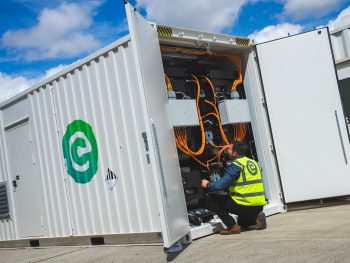Nissan and Connected Energy project to boost EV battery sustainability
A new project that aims to supercharge progress on electric vehicle battery sustainability is now underway in the UK.

The project targets the development of world-leading energy storage technology which uses multiple battery types to create a multi-megawatt system
Led by Nissan, the programme will build UK R&D capability and strengthen the technical expertise of teams in the country around zero-emission vehicles and batteries.
As part of the initiative, Connected Energy will lead on the second-life battery element of the project, building on the company’s existing technology to deliver large-scale energy storage sites using EV batteries.
The company’s energy storage systems are designed and developed inhouse using second-life EV batteries – and can be used for applications including overcoming power capacity issues on the grid, helping buildings with solar arrays to maximise their use of renewable energy and providing energy resilience. In an eco double whammy, such projects also significantly reduce the environmental impact of EV batteries by repurposing them.
The project strand is working to develop world-leading energy storage technology which uses multiple battery types with different states of health and performance characteristics. This will enable the company to demonstrate the ability of large-scale second-life systems to compete with new lithium-ion systems.
The project will scale up Connected Energy’s existing technology for a multi-megawatt system that become operational in 2025.
Matthew Lumsden, CEO of Connected Energy, elaborated: “Our goal is to develop and demonstrate a pioneering economic model for large-scale second-life energy storage systems that can be easily scaled up further and replicated. This will place Connected Energy and our network of partners at the leading edge of second-life battery use. Repurposing EV batteries in energy storage is a key contributor to vehicle electrification and sustainability while also helping towards the decarbonisation of the electricity grid.”
Large-scale battery energy storage systems can be used to support the energy flexibility and demand markets, storing energy when it is in abundance and selling it back to the grid when demand and prices are higher.
The energy storage strand is part of the wider £30.1m consortium project, which includes £15m of Advanced Propulsion Centre UK (APC) funding and aims to strengthen the UK’s capabilities in EV battery reuse, recycling and grid balancing.
The overall consortium is led by Nissan and partners also include lithium battery recycling experts Altilium, alongside Connected Energy.
“This is a groundbreaking project combining the expertise of the UK’s biggest EV manufacturer, one of the world’s most advanced second-life companies, and recycling pioneers Altilium. Bringing together these key players has the potential to create a world first in the creation of a model for true battery circularity,” added Lumsden.
Battery storage systemsConnected EnergyNissansecond life batteries

